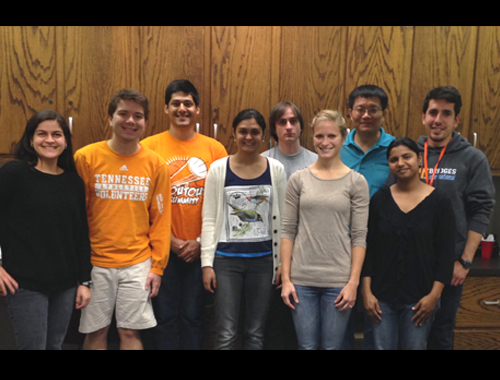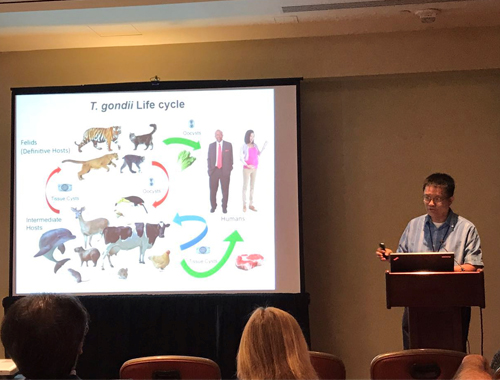
Dr. Chunlei Su is an Associate Professor in the Department of Microbiology at the University of Tennessee (UT). His research interests focus on molecular epidemiology, genetic diversity, and the ecology and evolution of Toxoplasma gondii (a single-cell parasite that infects mammals and birds). Dr. Su received his master’s degree in Animal Science from Brigham Young University and his Ph.D. in Pathobiology from Pennsylvania State University. He joined UT in 2004 after serving as a postdoctoral fellow at Washington University in St. Louis.
Dr. Su’s primary research goals are to better understand the transmission of T. gondii between hosts and the process by which humans become infected by the parasite. Approximately one-third of the human population is chronically infected by T. gondii. The most common form of the infection is asymptomatic but in some conditions, including people with compromised immune systems (e.g., AIDS patients) and infants can suffer from damage to the brain, eyes, or other organs, serious inflammation and occasionally fatal illnesses like encephalitis. Infected pregnant women can also pass the parasite to their fetuses, resulting in congenital toxoplasmosis.



Dr. Su has developed a whole-cell antigen, using T. gondii cells in culture, that can be used in a modified agglutination test (MAT) to detect antibodies to T. gondii from serum, plasma, or tissue fluids. The MAT test is a widely used, simple, and cost-effective method for detecting T. gondii infection and can be used to detect antibodies in a wide range of birds and mammals, including humans. Known as TgMAT, the research material is readily available for other researchers to use through the University of Tennessee Research Foundation’s (UTRF) Express Licensing system. Dr. Su believes TgMAT will help researchers learn more about T. gondii transmission and identify actions that can be taken to prevent or mitigate T. gondii transmission to humans.
In South America, approximately 50 percent of the population is infected by T. gondii. As a 2015 Fulbright Scholar, Dr. Su spent three months at the University of Sao Paulo studying the molecular epidemiology of toxoplasmosis in Brazil. While there, he conducted a three-week workshop to train graduate students and researchers on how to conduct molecular epidemiology population genetic studies on T. gondii to better understand transmission based on the relationship between genotypes. Dr. Su looks forward to expanding his work and collaboration in South America in the years to come.
Dr. Su serves as an affiliate faculty member at the National Institute for Mathematical and Biological Synthesis (NIMBIoS), a science synthesis center sponsored through the National Science Foundation that explores the interface between math and biology. At NIMBIoS, Dr. Su is working with colleagues in math and biology disciplines to use mathematical models to study T. gondii transmission from an ecological point of view. Dr. Su’s work with T. gondii has resulted in several peer-reviewed publications and international collaboration to uncover the population genetics of T. gondii around the world.